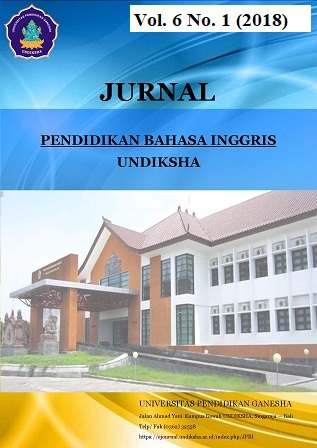THE CORRELATION BETWEEN MEMORY AND USES OF WORDS MEANINGS AND USAGES OF SEVENTH GRADE STUDENTS AT SMP N 5 SINGARAJA
DOI:
https://doi.org/10.23887/jpbi.v6i1.20402Abstract
The objective of this research was to know whether there is any correlation between memory and uses of the words meanings and usages. There are there research problems were examined. It is about the total words meanings and usages remembered by the students, the uses of the words meanings and usages in the four language skills, and the correlation between memory and uses of the words meanings and usages. This research conducted at SMP N 5 Singaraja and the sample used was students in the seven grade consisted of 62 students. The data were collected using test and questionnaire. The result of test shows that the highest total number of words meanings and usages remembered by the students is 115 words (90%) from the total number of words is 128 words while the lowest total number of words meanings and usages remembered by the students is 64 words (50%). The most word class remembered by students in terms of word meanings and usages is noun that is 75% and word class adverb is 42% remembered by the students. The result of questionnaire shows that students used words meanings and usages frequently in reading. In reading, 62 students (100%) used words meanings and usages in terms of word class noun, verb, adjective, and adverb. The result of data analysis shows that there is a significant correlation between memory and uses of words meanings and usages. It could be seen by looking at the result of Point-Biserial Correlation coefficient r that is 0.564.
Key Words: memory, uses of words meanings and usages
References
Cabrera, M., & Bazo, P. (2002). Teaching the Four Skills in the Primary EFL Classroom. Retrieved June 12, 2014 from The Internet TESL Journal Vol. VIII No 12.
Case, A. (2008). Why Your Students Have Problems with Listening Comprehension. Retrieved March 5, 2014, from Using English.com: http://www.usingenglish.com/articles/why-your-studnets-have-problems-with-listening-comprehension.html
Cox, David. (2012). How to Treat Your Brain During Revision Time. Retrieved March 12, 2014, from theguardian.com:
http://www.theguardian.com/education/mortarboard/2012/nov/06/how-your-brain-likes-to-revise
Forster. (1979). Memory and Written Storage. Theoretical Aspects .
Levine, Mel. (2002). Difficulties with Writing. Retrieved March, 5, 2014, from pbs.org: http://www.pbs.org/wgbh/misunderstoodminds/writingdiffs.html
Levine, Mel. (2002). Difficulties with Reading. Retrieved March, 5, 2014, from pbs.org: http://www.pbs.org/wgbh/misunderstoodminds/readingdiffs.html
McHugh, S. (2014). English Speaking Tips for 4 Common Difficulties. Retrieved March 5, 2014, from espressoenglish: http://www.espressoenglish.net/english-speaking-tips-for-4-common-difficulties
Pastorino, E. (2012). What is Psychology? Essentials . United States: Cengage Learning.
Ratminingsih, N. M., Suwatra, I. I. W., Rasana, I. D. P. R. (2013). Pengembangan Model Pembelajaran Bahasa Inggris Induktif Berbasis Lagu Kreasi (Scripted Songs): Inovasi PembelajaranIntegratif dan Holistik dengan Insersi Nilai Budaya dan Karakter Bangsa. Ganesha University of Education: Singaraja
Thornbury, S. (2002). How to Teach Vocabulary. Longman.
Waring, R. (n.d.). Vocabulary Size, Growth, and Use. Retrieved June 12, 2014, from fltr.ucl.ac.be: http://www.fltr.ucl.ac.be/fltr/germ/etan/bibs/vocab/cup.html
Downloads
Published
Issue
Section
License
Authors who publish with the Jurnal Pendidikan Bahasa Inggris Undiksha agree to the following terms:- Authors retain copyright and grant the journal the right of first publication with the work simultaneously licensed under a Creative Commons Attribution License (CC BY-SA 4.0) that allows others to share the work with an acknowledgment of the work's authorship and initial publication in this journal
- Authors are able to enter into separate, additional contractual arrangements for the non-exclusive distribution of the journal's published version of the work (e.g., post it to an institutional repository or publish it in a book), with an acknowledgment of its initial publication in this journal.
- Authors are permitted and encouraged to post their work online (e.g., in institutional repositories or on their website) prior to and during the submission process, as it can lead to productive exchanges, as well as earlier and greater citation of published work. (See The Effect of Open Access)













